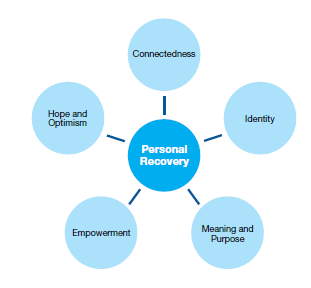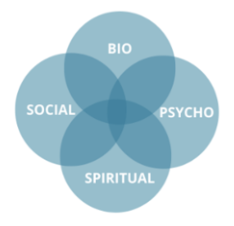Recovery
In mental health, the word ‘recovery’ has two meanings, clinical recovery and personal recovery.
Clinical Recovery – when someone ‘recovers’ from the illness and no longer experiences its symptoms.
Personal Recovery – recovering a life worth living (without necessarily having a clinical recovery). It is about building a life that is satisfying, fulfilling, and enjoyable.
Personal Recovery
Personal recovery is “(a) deeply personal, unique process of changing one’s attitudes, values, feelings, goals, skills and/or roles. It is a way of living a satisfying, hopeful, and contributing life even with limitations caused by the illness. Recovery involves the development of new meaning and purpose in one’s life as one grows beyond the catastrophic effects of mental illness (Anthony, 1993, p. 527).”
CHIME Recovery Framework
Researchers at Kings College (UK) identified 5 components that make up the recovery process – Connectedness, Hope and optimism, Identity, Meaning and purpose, and Empowerment, providing the acronym CHIME.
Leamy, Bird, Le Boutillier, Williams & Slade, 2011
Recovery and Spirituality
Many people with mental illness find spirituality—whether religious or not—helpful for recovery. It helps them manage symptoms, cope with challenges, and find meaning, purpose, connection, and hope.
Recovery is about finding new meaning and purpose in life (Anthony, 1993). Spirituality gives direction and helps people handle life's ups and downs (Swinton & Pattison, 2001). Recovery can be a spiritual journey, reconnecting people with themselves, others, their environment, and a greater sense of purpose (Spaniol, 2002).
MISTIC Spirituality Framework
Research from the University of Nottingham (Milner et al., 2020) explored how adults with mental health issues experience spirituality. They identified six themes, giving the acronym MISTIC
Meaning-making
Identity
Service-provision
Talk about it
Interaction with symptoms
Coping
The study showed spirituality plays a big role in many people's lives and should be part of holistic mental health care. It also highlighted how spirituality and recovery overlap, especially in finding meaning and identity, amplifying their impact.
Recovery is “a spiritual journey by which people with psychiatric disabilities rebuild and further develop their connectedness to themselves, to others, to their living, learning, and working environments, and to larger meaning and purpose (2002, p. 332).”
References
Anthony W (1993) Recovery from mental illness: the guiding vision of the mental health system in the 1990s, Psychosocial Rehabilitation Journal, 16(4), 11-23. here
Leamy, M., Bird, V., Le Boutillier, C., Williams, J., & Slade, M. (2011). Conceptual framework for personal recovery in mental health: systematic review and narrative synthesis. British Journal of Psychiatry, 199(6), 445-452. here
Milner K, Crawford P, Edgley A, Hare Duke L, Slade M (2020) The experiences of spirituality among adults with mental health difficulties: a qualitative systematic review, Epidemiology and Psychiatric Sciences, 29, e34. here
Puchalski CM, Ferrell B, Virani R, Otis-Green S, Baird P, Bull J, Chochinov H, Handzo G, Nelson-Becker H, Prince-Paul M, Pugliese K, Sulmasy D: Improving the quality of spiritual care as a dimension of palliative care: The report of the consensus conference. J Palliat Med 2009:12:885–904. here
Swinton, J., & Pattison, S. (2001). Spirituality. Come all ye faithful. The Health Service Journal, 111(5786), 24-25. here





